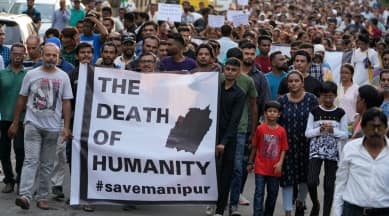The shutdown of the internet has certainly had a huge impact on the lives and livelihoods of even those people who have not been impacted by the violence. More accountability is needed, especially from rulers who are ready to impose bans.

Historically, punishment has proven to be the greatest deterrent to crime. Evidence of a crime is key to assigning punishment, so the fear of being caught on camera can keep even the most feared criminal from committing the most heinous acts. Internet shutdowns must be seen in this context, especially in a region wracked by violence: a blanket ban gives an offender a sense of impunity that his targets are fair game with no oversight mechanism.
Manipur teaches us more, just as previous cases of bloody violence in India and elsewhere have taught us. The wanton killings in the state and the weaponization of gang rape to spread a reign of terror came to light very late. It needed a May 4 video of two Kuki women being stripped naked and taken away by a large group of males from the rival Meitei community for the government to wake up and cry out in national shame. Demonstrate the power of technology and its judicious use. This author and several others who had visited the state had warned the government of the brutalities taking place in the northeastern state, but they were not taken seriously. The central government has continued to remain silent in the face of mounting evidence of atrocities and acts of omission in that state by the government and deployed forces.
But the powers of the internet and cameras are so compelling that our rulers are now forced to condemn the gruesome incident after the horrific video went viral. Even so, the government’s overall response to the Center is the Twitter equivalent of a #hushup campaign. They are ashamed of their inaction and indifference and want to sweep things under the carpet. Despite the pleas of fact-finding teams who had taken the risk of visiting the state, the government was at its phlegmatic best, as if everything was under control. The outrage caused by the video shot 79 days ago has brought out the true picture of what is happening in the state. While what’s in the public domain so far is just the tip of the iceberg, more people have started to realize that the internet allows for transparency and therefore accountability. Governments, both Center and state, speculated that shutting down the internet was the antidote to halting the spread of violence. They have been proven terribly wrong. If this video which is now becoming widely circulated had surfaced the day it took place, it may have prompted the government to act quickly rather than watch and let wounds worsen. Unfortunately, even now, the declarations of the Center’s top management do not suggest an admission of guilt and serious administrative incompetence. They are busy defining a stain for the nation to evade accountability.
You’ve run out of yours
monthly limit of free stories.
To continue reading,
just register or log in
Read on with an Indian Express Premium Membership starting at Rs 91 per month.
This premium item is free for now.
Register to read more free stories and access partner offers.
Read on with an Indian Express Premium Membership starting at Rs 91 per month.
This content is exclusive to our subscribers.
Subscribe now for unlimited access to exclusive and premium stories from The Indian Express.
We all know technology has its limitations and dangers, but relying on the futility of shutting down the internet to curb violence exposes the one-dimensional approach of this government, which has repeatedly warned against such an action.
Parliament’s Standing Committee on Communications and Information Technology, of which the writer is a member, deliberated at length on the issue of frequent internet outages some years ago. On 1 December 2021, the Standing Committee presented its report on the suspension of telecommunications/Internet services and its impact to Parliament, recommending a wide range of measures to the Department of Telecommunications and the Ministry of Home Affairs, including regulatory review, oversight mechanisms, transparency and the need for consultation with stakeholders. But the departments have shown a dismissive attitude towards the implementation of these recommendations.
The parliamentary standing committee was stunned to find that none of the ministries had any reports of internet outages in different places across the country. Furthermore, it was noted that although a new temporary suspension of telecommunication services was planned (Public Emergency and Public Safety Rules, 2017), the closures were also implemented under CrPC section 144, which requires the approval of a low-ranking official such as a Tahsildar. The Telecom Regulation issued in 2017 made no reference to Section 144 of the CrPC.
Expressing its disappointment at the negative attitude of departments in implementing its previous recommendations, the Standing Committee on Communications presented its report on the action taken to Parliament on 9 February 2023. These recommendations emphasized that government and agencies are responsible for shutting down the internet.
In addition to the Standing Committee, the Supreme Court and various high courts have also emphasized the importance of the Internet and have issued directives and instructions through a series of rulings. Historic rulings, including the notable Supreme Court ruling in the case of Anuradha Bhasin vs Union of India (2020), have deeply underscored the critical importance of the internet. In the Anuradha Bhasin ruling, the Supreme Court issued detailed guidelines and categorically proclaimed that the freedom of speech and expression and the freedom to exercise any profession or to engage in any trade, business or occupation via the Internet enjoys constitutional protection under Article 19(1)(a) and Article 19(1)(g). But every part of it has been mocked by various governments.
Several people, including the writer, have warned of the impact of the internet shutdown on economies now far more dependent on it for services and business purposes. The cost of such arrests is enormous and a crime against humanity.
Industry sources have made a conservative estimate of a staggering loss of nearly Rs 40,000 crore over the past three years due to more than 16,000 hours of internet outages across the country. It is equally pertinent to note that the impact extends well beyond the realms of economics and has the potential to affect even mundane activities. The loss on the business front is tangible, but the devastating impact on education, information, health, entertainment and other aspects of life finds no mention in official reports.
In the case of Manipur, while it is unwise to assume that constant ingestions of violence would set the government into action, the shutdown of the internet certainly had a huge impact on the lives and livelihoods of even those people who were unaffected by the violence. More accountability is needed, especially from government officials who are ready to impose bans on Internet services. All the evidence suggests that such extravagant actions are counterproductive and that there is no substitute for government transparency.
The author is a MP from CPM Rajya Sabha. He was recently in Manipur to visit people affected by the violence.
First published on: 07-24-2023 at 11:51 CEST
#John #Brittas #Manipur #video #internet #backfires
Image Source : indianexpress.com
